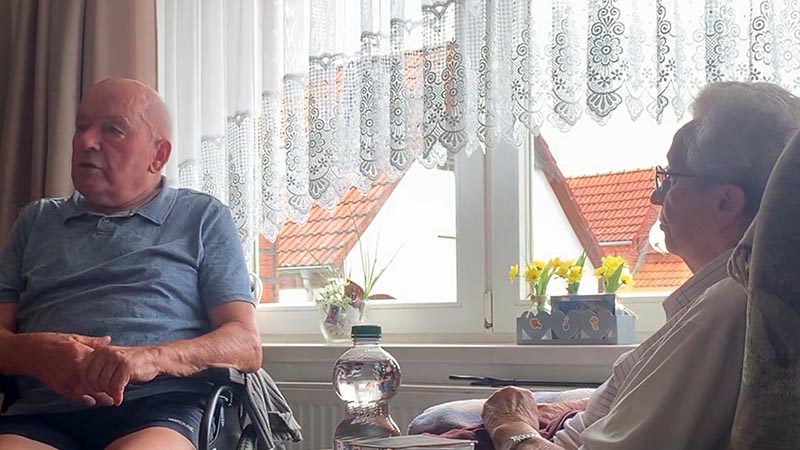
An interview
We meet them by chance on the street. Mr Schulz is pushing his wife around the village in a wheelchair. We ask them for an interview, whether they would be willing to tell us a bit about what it is like to live in Döllen. We immediately start chatting. Only today there's not enough time for a conversation, we are supposed to call first, it would just depend on the state of the day. Sometimes they are both just tired.
Mr. Schulz came with his mother and siblings after 1945 from Grossen because they had to leave their flat there within an hour. A typical refugee story. He now calls Doellen his home. He was too young back then, home, he says, has become Döllen.
They only had a few belongings, the bare necessities, that what could fit into a suitcase that they could carry. They got as far as Cottbus and then took a shunting train to Berlin's Lehrter station, where they had to camp out for three weeks until they knew where to go next. Until it was clear that they were going to the Prignitz. One started here as a refugee with nothing. Here in Doellen, says Mr Schulz, he then went to school. Mrs Schulz also went to school here. She was always from Döllen. Her uncle was a shoemaker in the village.
And that brings us to the infrastructure. Actually, there was everything in the village: a hairdresser, two restaurants, a shop - even for textiles. Even a telephone booth. And today there is nothing left, not even a bus with which the elderly could do their shopping. Nothing.
The village is practically deserted, no one who has to get from A to B, no one with whom you can talk a little, keep in touch, form a community. Towards evening, people return from the other villages and towns. They quickly drive to their garages and are happy if there is still some energy left to organise the rest of their own everyday life.
Mrs. Schulze is sad about it, Mr Schulz too: "But not now", she says: "I don't see it as worth living any more. I mean, we are not doing badly, we get our pensions. After all, we worked for over 40 years, both of us. So it's not an issue, but" Mrs. Schulz searches for words: "one is not so free, one" and then she can't find any more words.
Mr. Schulz adds: "Well, sometimes you are not as satisfied as you used to be, I say. We used to grumble too. About not having this and that or something - but on the whole we were more satisfied. That's how I have to put it. We were more satisfied - in any case.
Then Mrs. Schulz adds: "Our children all learned a profession. There was no question at all. They already asked what they wanted to be, what they wanted to do...
listen here: